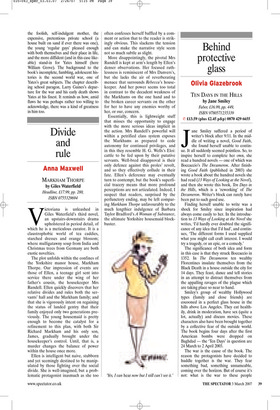Divide and rule
Anna Maxwell
MARKHAM THORPE by Giles Waterfield Headline, £17.99, pp. 280, ISBN 0755329694 Victoriana is unleashed in Giles Waterfield’s third novel, an upstairs-downstairs drama upholstered in period detail, of which he is a meticulous curator. It is a claustrophobic world of tea caddies, starched dresses and orange blossom; where mulligatawny soup from India and Christmas trees from Germany are both exotic novelties.
The plot unfolds within the confines of the Yorkshire manor house, Markham Thorpe. Our impression of events are those of Ellen, a teenage girl sent into service there under the wing of her father’s cousin, the housekeeper Mrs Rundell. Ellen quickly discovers that her relative divides and rules both the servants’ hall and the Markham family; and that she is vigorously intent on regaining the status of landed gentry that their family enjoyed only two generations previously. The young housemaid is pretty enough to become the catalyst for a refinement to this plan, with both Sir Richard Markham and his only son, James, gradually brought under the housekeeper’s control. Until, that is, a murder changes the balance of power within the house once more.
Ellen is intelligent but naive, stubborn and yet seemingly destined to be manipulated by those fighting over the social divide. She is well-imagined, but a problematic protagonist inasmuch as she too often confesses herself baffled by a comment or action that to the reader is strikingly obvious. This slackens the tension and can make the narrative style seem not so much subtle as slight.
More disappointingly, the pivotal Mrs Rundell is kept at arm’s length by Ellen’s denser observations. Her focused ruthlessness is reminiscent of Mrs Danvers’s, but she lacks the air of reverberating menace that surrounds Rebecca’s housekeeper. And her power seems too total in contrast to the decadent weakness of the Markhams on the one hand and to the broken career servants on the other for her to have any enemies worthy of her, or our, concern.
Essentially, this is lightweight stuff that misses the opportunity to engage with the more serious ideas implicit in the action. Mrs Rundell’s powerful will within a petrified class system exposes the Markhams as prepared to cede autonomy for continued privileges, and in this they resemble H. G. Wells’s Eloi: cattle to be fed upon by their putative servants. Well-bred disapproval is their only defence against this proles’ revolt, and so they effectively collude in their fate. Ellen’s deference may eventually turn to contempt, but the book’s superficial tracery means that more profound perceptions are not articulated. Indeed, I suspect that readers, surprised by the perfunctory ending, may be left comparing Markham Thorpe unfavourably to the much lengthier indulgence of Barbara Taylor Bradford’s A Woman of Substance, the ultimate Yorkshire housemaid blockbuster.










































































 Previous page
Previous page